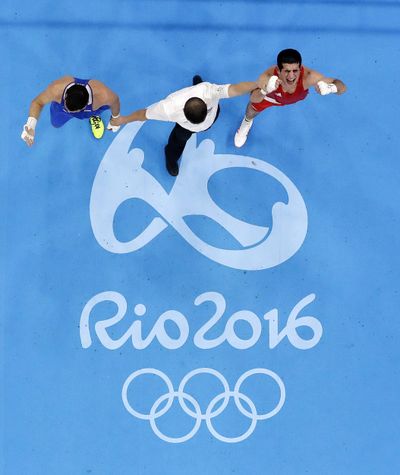Is NBC’s prime-time Olympics due for a change?

NEW YORK – A former journalist turned college professor, Kelly Whiteside is watching NBC’s prime-time Olympics coverage this month for the first time in 16 years. She’s surprised at what she’s found – not because the programs have changed so much, but because they haven’t.
“It’s almost like a time capsule for me,” said Whiteside, who covered several Olympics for USA Today.
Much of what NBC does at other times is markedly different from what she remembers; the Olympics are spread around nearly a dozen different cable networks and every competition is streamed live online. Yet NBC’s prime-time, the Olympics point of entry for the vast majority of viewers, has remained an island unto itself by sticking to a time-honored formula.
Prime-time ratings are down this year from the record-setting London Games, and NBC says a big reason is because more people are watching cable or their devices. But it’s worth posing the question: Is the formula growing stale?
NBC’s prime-time focuses on a handful of sports – swimming & diving, track & field, gymnastics, beach volleyball – to the virtual exclusion of all others. It’s a mix of live and “plausibly live,” or tape-delayed coverage that allows action to unfold as it happens. A narrative style humanizes otherwise unknown athletes, letting viewers page through a picture book that swimmer Ryan Murphy drew as a child or watch gymnast Aly Raisman’s parents squirm in the stands.
A majority of viewers are women; 55 percent through Rio’s first six nights. NBC assumes many aren’t sports fans and, in an attention-getting comment last month, NBC chief marketing officer John Miller said that women are “less interested in the result and more interested in the journey. It’s sort of like the ultimate reality show and miniseries wrapped into one.”
That struck some fans as patronizing and reflective of a poor understanding of the audience in an era when women also make up the majority of the U.S. Olympic team.
“We’ve all grown up playing sports,” said Joanne Gerstner, who teaches sports journalism at Michigan State. “We have kids that are playing sports. Who are these groups of women they feel are so alien to sports that they have to be catered to in this way? I don’t know who these people are.”
Whiteside, who teaches at Montclair State University in New Jersey, said she appreciates knowing about the athletes competing. But, she said, “I don’t view the Olympics as reality TV. I view it as a great sporting event.”
Washington Post columnist Sally Jenkins wrote that a network would never think of cutting and pasting highlights of a football game around childhood film of Peyton and Eli Manning on a swing set. With its heavy packaging, NBC is “living in the past,” she wrote.
NBC points to its live streams as evidence that people can watch events like the gymnastics finals live if they want. Showing the most popular sports at a time most viewers are available is a service both to the fans and those who bought more than $1.2 billion in advertising.
“The way we create our storytelling and our narrative, mixed in with incredibly compelling competition, I think is working for men, women and children,” NBC Sports Group chairman Mark Lazarus said this week. “And that’s our goal. This is a very big tent and all are welcome. We program, we schedule, and we try to create a show around the competition that’s welcoming to all. And I think so far we’re finding success.”
NBC’s Olympics operation is a deeply experienced and talented team. Gary Zenkel, in his 11th Olympics, runs the business operations. Jim Bell, former “Today” show producer, is the top producer. His first NBC job out of college was working at the Barcelona Olympics. Both count former NBC Sports president Dick Ebersol as a mentor; Ebersol himself was a protege of ABC’s Roone Arledge and the “up-close-and-personal” Olympics coverage of generations ago.
Three of the 27 executives profiled on the NBC Olympics press website are women.
The team’s experience, and the rarity of any TV programs reaching such a huge audience in today’s fragmented world, makes it unlikely NBC will blow up the formula for prime-time to try something completely new.
Given the rapid change in the way people watch TV in an on-demand world – and a 2020 Olympics in Tokyo, where there will likely be less live competition to show on prime-time in the United States – NBC may have to consider changes more quickly than it expects, said Andy Billings, a University of Alabama sports media professor and author of “Olympic Media: Inside the Biggest Show on Television.”
And what would that new formula be? That’s the tough question.
One idea would be a combination of live events with “SportsCenter”-like highlights and interviews, taking in a far greater range of Olympic sports. “I think the audience would be even greater,” Whiteside said.